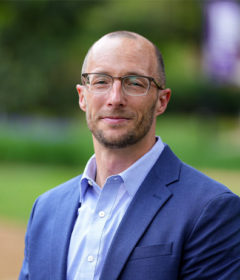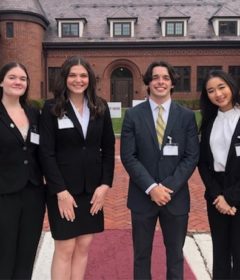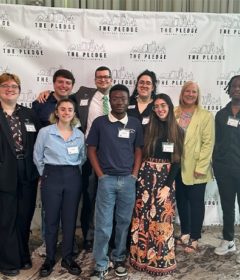5 Minutes with … Christopher M. Pietruszkiewicz
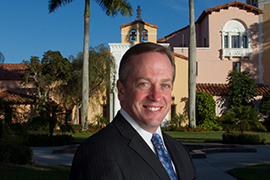
Tell us about your job at Stetson.

Fifteen years ago, a Dean’s job at the College of Law was very different than it is today. In the past, we made tweaks to the curriculum to help students get better prepared for practice. Today it is so much broader. It is understanding our community, connecting with students, and telling the story about their successes. It is trying to find ways – big and small – to help to make the law school experience for students better and finding ways to value our faculty and staff who are the foundations of what we do to make Stetson a special place.
As a private law school in a state with 11 other law schools, we have identified the ways that we add value for students as they decide on where they’re going to spend three years or four years as part of their law school career and where they will identify as alumni forever. A significant part of the role is external, connecting with the 9,000 Stetson Law alums and telling the story about what Stetson is doing and what it wants to do in the future.
I also serve on a number of national boards – the Law School Admission Council and the American Bar Association’s Standards Review Committee. Serving in a national capacity provides a unique opportunity to understand some of the trends before they happen. As Wayne Gretzky used to say, you don’t want to skate where the puck has been. You want to skate where the puck is going. And a big part of that service in national organizations is to help us figure out where the puck is going.
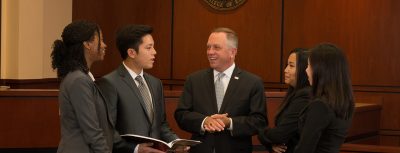
How long have you worked at Stetson?
I have been here almost five years and started in July 2012. Earlier in my career, I spent five years at the U.S. Department of Education and four years at the U.S. Department of Justice in Washington, D.C, as a trial attorney flying around the country and trying cases on behalf of the United States. While I was trying to figure out how to get to Louisiana and Florida and Alabama and Mississippi to take depositions and try cases, I taught as an adjunct at George Mason University’s law school, teaching corporate tax classes on Tuesday and Thursday evenings.
After successfully accomplishing that for a semester, I thought about doing it full-time and I was very fortunate that Louisiana State University in Baton Rouge asked me to interview. It all happened pretty quickly and about three months after the process began, my family and I moved from Washington, D.C., to Baton Rouge, where I spent 12 years on the faculty of LSU’s Law Center – the last five years as Vice Chancellor for Business and Financial Affairs.
In recent years, many law schools have gone through a period of change. How has that impacted Stetson’s College of Law?
In 2012, when I started here, legal education was changing. The largest class in the history of legal education enrolled in 2010, and because of various factors, the number of people applying to law schools has decreased pretty substantially — 40 percent since 2010.
The legal profession began asking law schools to do things differently and to be more transformational in student learning. As I thought about becoming the Dean at Stetson, one of the things that struck me was that Stetson already was doing many of the things that I thought legal education was going to have to do in the future. It had already blended much of its skills and doctrine together. Stetson created the first trial advocacy program in 1902, and the first clinic in the state of Florida in the 1960s. So while I thought many law schools had to make dramatic change, I thought Stetson was well-positioned to help its students be better prepared for what the profession is asking them to do immediately after graduation. Fortunately, for me, over the last five years, I have found exactly that – Stetson was far ahead of the curve.
When people ask why should they attend Stetson Law School, what do you say?
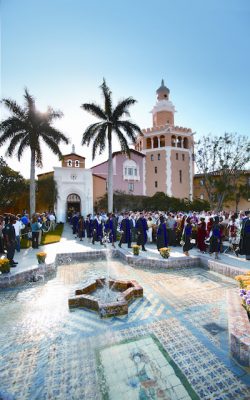
Stetson has a distinct value that makes it unique among many other law schools. Our advocacy program has been ranked No. 1 in the country by U.S. News & World Report for 19 of the last 23 years and this ranking is voted on by faculty members at other law schools that teach advocacy. We hear from many judges and lawyers that they can tell a Stetson student in the courtroom because of the training they received at Stetson. Our legal writing program has never been ranked outside of the top six… so the two things that Stetson does best are the two things that lawyers are asked to do on a daily basis in practice: advocate for clients orally and in writing.
Our veterans’ programs have been innovative, creating the first legal-medical partnership in the country in which law students, medical students, residents and law professors work together to help veterans obtain benefits from the Department of Veterans Affairs based on their service to our country. The VA Medical Center, just about 15 minutes from campus, is one of the largest medical facilities outside of Washington, D.C., and we were the first academic institution to help coordinate with legal-aid organizations to locate a legal clinic inside the VA hospital to help veterans with non-criminal matters.
Importantly, our students engage in over 30,000 hours of pro bono service every year. And that means we help fill some of the justice gap that exists in the United States, volunteering to work with legal aid organizations in our communities to give Floridians access to legal services that they otherwise wouldn’t have.
What trends do you see happening in legal education in the next five to 10 years?
At Stetson, our employment statistics for students graduating from law school have been excellent, for working at traditional places like law firms, the State Attorney’s Office and the Public Defender’s Office, and more and more, law schools are being looked at by business and industry for people to hire in what they call J.D.-Advantage jobs. These are jobs for which passing the Bar exam is not required, but a legal education is helpful in developing their critical-thinking skills.
No longer are business and industry simply looking to lawyers when a problem arises. Business and industry are looking for people with a legal education to help them run businesses and be part of their management structure. As more and more areas of compliance arise, law students are being sought after by compliance departments and, in particular, in the healthcare field. While these jobs have not been traditionally held by lawyers, there are increasing opportunities for law students.
So where do I think legal education is going in the future? I think more and more people will go to law school for non-traditional legal jobs because the education, training and skills that that you develop in law school are transferable across a broad spectrum of jobs.
What do you enjoy doing in your free time?
I have a wonderful family with two relatively small children, ages 11 and 7. They love athletics and I spend my free time watching baseball, basketball, and taekwondo — and playing some golf with them.
For the last 20 years, up until the time I became dean at Stetson, I was a high school and NCAA college basketball official. And when I became dean, I retired. My wife is also a high school and NCAA basketball official, and earlier this year she asked me to do a charity basketball game together. We had so much fun that she convinced me that I could do a couple of games a year, and so she and I officiated a few high school basketball game together this year – the boys joined us and finished each night with pizza and ice cream. It turned out to be a wonderful time together.
I work out early in the morning and I am still an avid runner – just a little slower.
Bio
Education: Bachelor of Science from the University of Scranton, Pennsylvania; a Juris Doctor degree from Loyola University in New Orleans; and a Master of Laws degree from Georgetown University.
Hometown: Scranton, Pennsylvania
Family: He and his wife Siobhan have two sons, Ryan, 11, and John, 7.
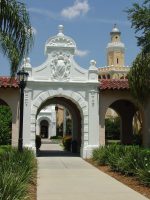
Fast Facts
Stetson University College of Law
Where: Gulfport/St. Petersburg with a satellite center near downtown Tampa
Founded: in 1900, Florida’s first law school
Enrollment: 759 students (647 full-time; 112 part-time)
Faculty: 54 full-time faculty members, 159 part-time

